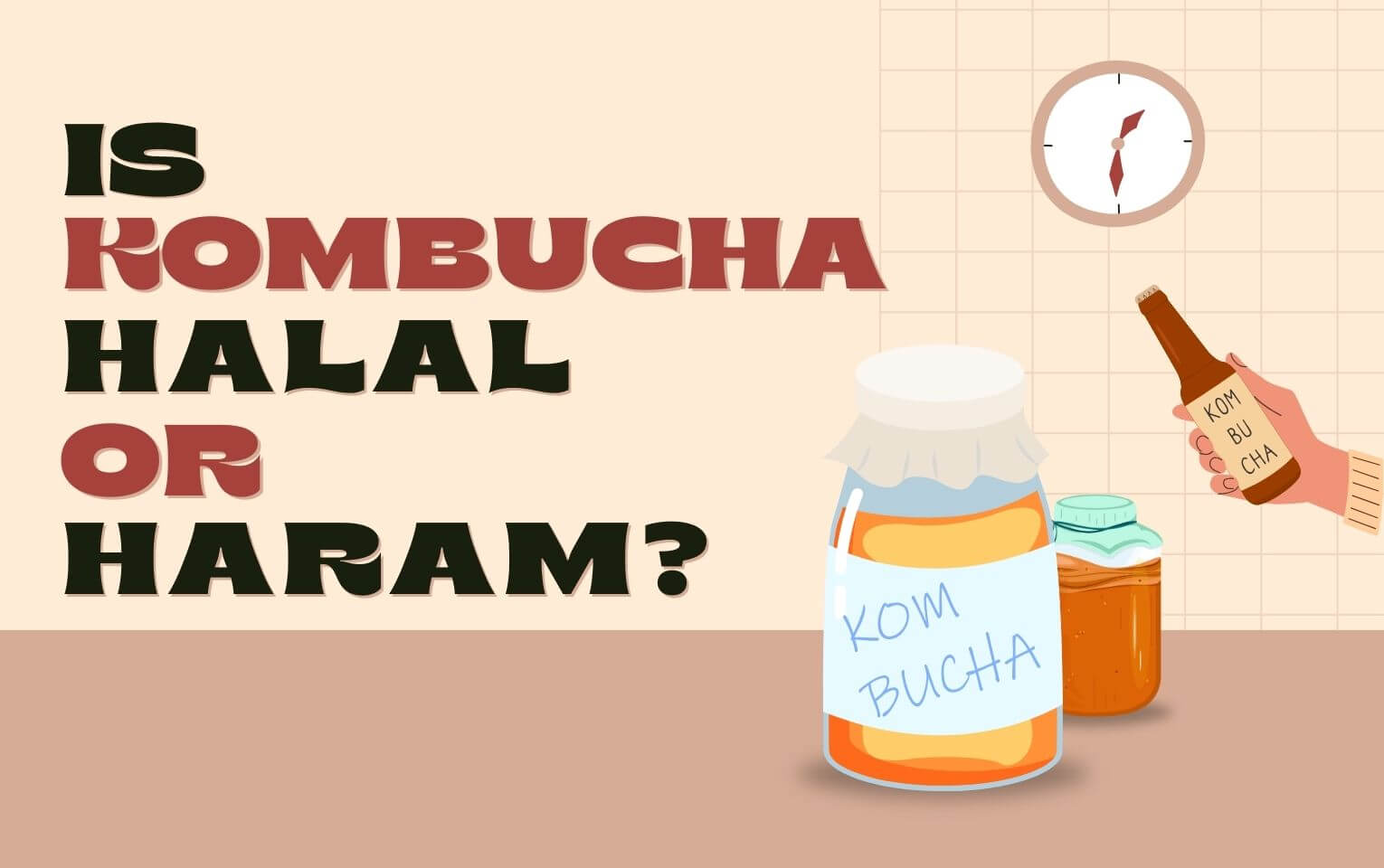In Islam, it is halal to have a little bit of alcohol if it’s not on purpose and doesn’t have any effect. Since kombucha’s alcohol content is shallow and doesn’t make you drunk, it’s fine to drink for Muslims.
The process of fermenting tea isn’t against Islamic rules. So, Muslims can enjoy kombucha without worrying because it has hardly any alcohol and won’t make them intoxicated.
But still, take a closer look at ingredients what goes into it, and how it’s made to understand it better.
Kombucha Has Health Benefits But Does That Matter?
In Islam, what makes food halal (permissible) isn’t just about how healthy it is. Even though kombucha is praised for its health benefits, like aiding digestion and having antioxidants, that doesn’t automatically make it okay to drink under Islamic dietary laws.
Islamic rules come from the Quran and Hadith, not from how good something is for you. For instance, even though pork has nutrients, it’s still forbidden. Wine, despite its health benefits, is also not allowed because it’s intoxicating.
So, when scholars decide if kombucha is halal, they look at how much alcohol it has from the fermentation process. If it doesn’t make you drunk, it might be okay still less than 0.5% alcohol is acceptable.
But just being healthy doesn’t mean it’s allowed. It’s all about following Allah’s rules, not about health.
In simple terms, even though kombucha might be good for you, its halal status depends on its alcohol content, not its health benefits.
7 Fermented Beverages that Considered as Halal?
Muslims often ask if fermented drinks are allowed. Many traditional fermented beverages are halal. They use natural methods that barely produce alcohol.
Here are fermented drinks that are permitted for Muslims to enjoy:
- Kombucha – This fermented tea usually has less than 0.5% alcohol. The small amount makes it halal.
- Water Kefir – Kefir is made from fermenting grains in water. It has little to no alcohol so is permissible.
- Vinegar – Vinegar is used extensively in Muslim cooking. Natural fermentation creates halal vinegar.
- Ginger Beer – Traditional ginger beer has trace alcohol from fermentation. So it is normally halal.
- kvass – A fermented beverage from rye bread popular in Eastern Europe. Its low alcohol level keeps it halal.
- Amazake – A thick fermented rice drink with a negligible alcohol content.
- Boza – A traditional fermented millet drink from the Middle East and Balkans.
Kombucha’s growing popularity has sparked questions among Muslims about whether the fermented tea is halal. What guidance does Islamic scripture provide on fermented drinks? The Prophet Muhammad also did not prohibit fermented drinks. He focused on intoxication, stating that: Meaning: “Every intoxicant is unlawful and every intoxicant is Khamr.” (Sahih Muslim, Book of Drinks, Hadith 3961) This means that anything that makes you drunk or tipsy is not allowed in Islam. Even though kombucha has a bit of alcohol from fermentation, if it doesn’t make you drunk, it’s not considered haram according to this saying of the Prophet. He was mainly worried about things that make you drunk, not just alcohol. This shows that fermented drinks are okay if they have a low amount of alcohol and don’t make you drunk. The Quran does not directly mention kombucha or other fermented drinks by name. Most foods and drinks are halal for Muslims to eat and drink, as long as they’re not specifically forbidden. In Surah Al-Baqarah 2:173, the Quran states: Meaning: “He has only forbidden to you dead animals, blood, the flesh of swine, and that which has been dedicated to other than Allah. But whoever is forced by necessity, neither desiring it nor transgressing its limit, there is no sin upon him.” In Islam, the holy Quran and teachings of the Prophet Muhammad focus more on the harm caused by intoxication rather than fermentation itself. Because of this, kombucha, which has very little alcohol less than 0.5 %, is usually considered okay according to Islamic beliefs. Islamic scholars have different opinions about whether drinks like kombucha are halal or not. Kombucha is made through a process where bacteria and yeast ferment tea, which can produce a small amount of alcohol. Some scholars say that because the alcohol is a very small amount, it’s halal to drink. Others think that any amount of alcohol, no matter how small, is not allowed. Let’s Hear it from them: You can watch the full video here for his answer regarding these types of drinks: Here is his video on this topic: In Islam, opinions on fermented drinks differ. Some say they’re forbidden, while others allow them in moderation. It’s advised to learn about these viewpoints and consult local scholars to decide what’s halal. Yes, kombucha is generally considered halal for Muslims as it contains very low alcohol content, typically less than 0.5%, which does not cause intoxication. The alcohol content produced during fermentation is the key factor. If it’s negligible and doesn’t cause intoxication, the drink is usually considered halal. Not necessarily. While many traditional fermented beverages are halal, it’s crucial to check the alcohol percentage in each product, as higher levels may render them impermissible. Islamic dietary laws prioritize avoiding intoxication or harm. While fermentation itself isn’t prohibited, the concern lies with alcohol’s intoxicating effects. Yes, it’s advisable to be cautious. Checking ingredients and alcohol percentage is recommended, and consulting scholars can offer further guidance on permissibility. while enjoying kombucha and similar fermented beverages, it’s important for Muslims to be mindful of their ingredients and alcohol content. Remember, Allah’s guidance prioritizes our well-being and avoidance of harm. May Allah bless us with wisdom and clarity in making choices that align with His teachings. Ameen.More related guidelines you may interested to read:
Prophet Muhammad (S.A.W) View on Drinking:
Quran Guidance:
Is kombucha halal for Muslims to drink?
What determines if a fermented drink like kombucha is halal?
Are all fermented drinks permissible for Muslims?
Why do Islamic dietary laws focus on intoxication rather than fermentation?
Should Muslims be cautious about consuming kombucha and similar beverages?







